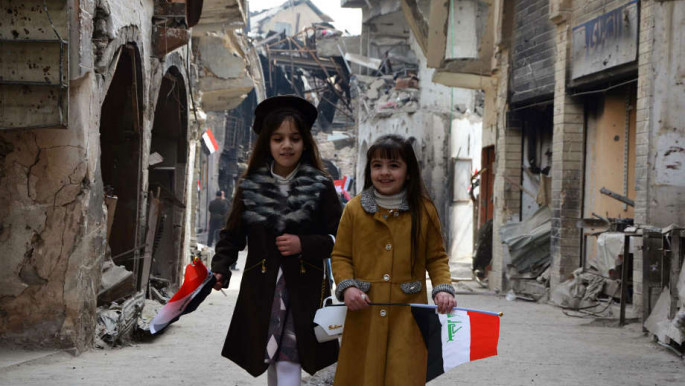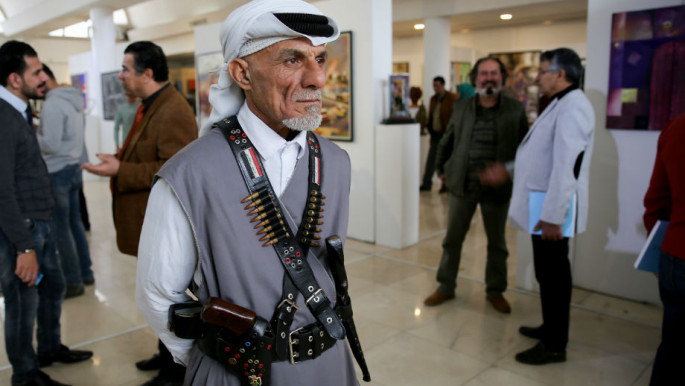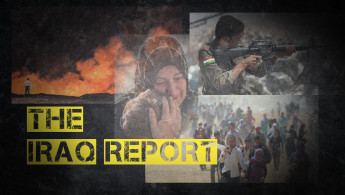The Iraq Report: Theatrics and point-scoring dominate electoral race
Click here to receive The Iraq Report each week in your inbox
With a little more than two months until local and national elections in Iraq, political parties and the incumbent government are in the full swing of the campaign.
Very few real plans have been announced of how any group intend to deal with some of Iraq's most pressing issues, with particularly those in the governing coalition focusing on token efforts, scapegoating and theatrics to appease their voter base.
The lack of political interest in dealing with major issues facing Iraqis - including rampant inequality, extreme poverty, and a large proportion of the population deprived of their homes - has led to a resurgence of Islamic State group militant activity.
This has even been seen in Mosul, Iraq's second city and the militant group's former capital in Iraq, retaken in July by Baghdad's troops and their allied Shia militias. Without solid action to remedy the most pressing problems facing normal people, Iraqi politicians may once again be leading their people into a quagmire of conflict and deprivation.
Iraq reclaims Saddam-era assets
One of the main topics of contention in the Middle East is precisely how wealthy various regime strongmen and sycophants have become off the backs of their own populations - and Iraq is no different.
Acting on the recommendation of the Accountability and Justice Committee - an Iraqi agency tasked with recovering assets from former officials and returning them to the public - Baghdad ordered assets and properties that allegedly belonged to former dictator Saddam Hussein to be seized.
The list that was drawn up by the Committee had Saddam's name front and centre, and also featured "his children, grandchildren [and] relatives". The list also contained the names of Ali Hassan al-Majid - Saddam's cousin, better known as "Chemical Ali" in the west - as well as hundreds of other former officials and regime cronies.
However, the publication of the list has not been without criticism.
Until 1990, Iraqis were mostly affluent, with one of the highest proportions of highly educated people in the Middle East. However, and during the reign of former Iraqi dictator Saddam Hussein, the United States led an international embargo to punish Iraq for invading Kuwait in 1990.
The sanctions regime - which lasted from the Iraqi invasion of Kuwait until the US-led invasion of Iraq in 2003 - saw representatives of the regime living in relative comfort and sometimes ostentatious luxury while normal Iraqis led austere lifestyles.
 |
| Iraqi girls in Mosul head to the re-opening of the city's market [AFP] |
Following the downfall of the Baathist regime, Iraqis were promised access to Iraq's considerable natural resource wealth. They were also promised justice for years of mismanagement, with the formation of bodies such as the Accountability and Justice Committee created to restore public wealth to public hands.
However, the vast majority of the assets controlled by Saddam Hussein were in fact registered under the name of the Iraqi state, and not as his personal property, nor that of his family. Much of today's Green Zone and the former presidential palaces where Saddam lived and ruled are already under the state's possession.
Similarly, and in terms of cash assets, there were very few verified stories of him possessing massive amounts, while in fact around $40 billion of Iraqi cash shipped to Baghdad went missing under US supervision over a number of years.
Ziad Tariq Aziz - the son of the veteran foreign minister, Tariq Aziz - condemned the order to seize assets as a "stunt to win votes" ahead of elections on May 12. Ziad said his father's house in Baghdad was already currently occupied by Ammar al-Hakim, an Iran-backed Shia cleric and politician, and that his family no longer had any assets.
"We've been subjected to pressure and injustice for 15 years; it's enough," Ziad told AFP in a telephone interview. "When will the spite of this so-called government end?"
A further question raised with regard to the timing of this announcement is why assets allegedly belonging to former Baathists were not seized in the immediate aftermath of the 2003 invasion. A decade and a half should arguably be long enough to dismantle what was left of a sanction-ridden regime.
New budget punishes Kurds to win votes
In what is being seen as another move designed to lock in votes, Iraq's parliament adopted a new budget on Saturday that will see the Kurds suffer a deep cut to their share of the national budget.
Reacting in anger at the tabled motion to reduce their allocation from 17 to 12.6 percent, Kurdish lawmakers boycotted the vote - which passed without any trouble. They then threatened to walk out on the political process, which would likely be an attempt to take a stab at the legitimacy of the central government.
As part of the budget, Baghdad will also expect the Kurdistan Regional Government (KRG) to export 250,000 barrels of oil per day, and to hand over the cash from those sales to federal coffers for reallocation. Failure to do so will lead to the finance ministry making further deductions from the KRG's portion of the national budget.
This latest attack on the KRG follows the botched independence bid last September, the aftermath of which saw Baghdad - with the help of Iran and proxy militias - retake much of the territory Kurdish units had claimed and defended at the height of the Islamic State group's power in 2014. Since the 92 percent "yes" vote for independence, Baghdad has imposed sanctions on Kurdish airports, effectively crippling them, and dealing significant damage to the KRG's economy while showing Erbil's vulnerability.
Iraqi Prime Minister Haider al-Abadi knows that former KRG president and current Kurdistan Democratic Party leader Massoud Barzani is deeply unpopular in much of Iraq, and has lost much of his support base following his failed independence bid.
Abadi is therefore counting on the majority of Iraqis who oppose Kurdish secessionism to vote for him, and it is therefore in his interest to continue cracking down against the KRG.
 |
| Baghdad's annual exhibition of of the Iraqi Fine Arts Association drew plenty of crowds, and characters [AFP] |
No compensation for Iraqi victims of IS war
While politicians attempt to distract Iraqis from day-to-day life with stories of the old regime and punishing the Kurds, many of the victims of the war against IS have still not received any compensation, leaving them to face terrible hardships.
The New Arab's Arabic-language sister site reported on Friday that politicians who are currently in power are promising to take care of the millions of vulnerable Iraqi widows and orphans, despite having not supported them for years.
Imad Khalil told The New Arab that he had been forced to leave his studies and to work as a street porter in Baghdad after a suspected IS suicide bombing killed his father and maimed his mother. According to Khalil, he has been promised financial aid but has not received anything from the government, forcing him to abandon his education in order to support his family.
Even the families of soldiers who fought against IS have not been spared, with corruption meaning veterans' families lose out on vital assistance, according to lawyer Hussein al-Muhanna. Muhanna said that the authorities made receiving payments extremely difficult for veterans and their loved ones, while corrupt officials would register deaths by car accidents or tribal infighting as a "martyr" against IS in order to claim compensation.
This has allowed countless people to fall through the cracks, particularly in a country with more than three million internally displaced persons, according to the UN. Civil society activist Hussam al-Isa said that politicians were latching onto this misery to win more votes, despite having been in a position to solve these problems a long time ago.
"We have five million orphans and two million widows, and it's for this reason that competing [political] blocs view this number of people as a storehouse of votes," Isa said. "All [these actions] are clear lies, especially as the political parties who are raising these slogans have been in power for years."
The lack of concern demonstrated by politicians has exacerbated already significant issues of poverty, deprivation and homelessness resulting from the destruction of homes and livelihoods during more than three years of war against IS. Even before IS extremists burst onto the scene in 2014 with such brutality, government negligence and sectarian policies had allowed people to become disenchanted not only with the government, but the political process itself.
This may partially help to explain how IS cells have managed to survive and re-emerge in Mosul, eight months after the city was recaptured by federal forces. With IS now conducting hit-and-run attacks in a city that was only recently declared clear of the extremists, politicians ought to take this as an indicator that the severe shortcomings of the state and the degradation of the societal mesh needs to be addressed rapidly, or else Iraq may be damned to many more years of bloodshed.
The Iraq Report is a weekly feature at The New Arab.
Click here to receive The Iraq Report each week in your inbox
Follow us on Twitter: @The_NewArab



